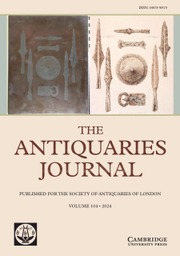No CrossRef data available.
Article contents
Three Gems in the Society's Collection
Published online by Cambridge University Press: 21 April 2011
Extract
The purpose of this note is to mark the transfer to the Society's museum of three Roman gemstones which came into my possession as gifts at different times and which I decided I would like to share with the Fellowship in general. The Society, indeed, has long owned a number of medieval and later seals and sealings, a few of which were recently displayed in the entrance lobby, and it has long seemed to me that the inclusion of Roman intaglios would make its holdings more representative for future students. Historians of medieval sigillography in the past were rather ignorant of Roman gems and, indeed, of Classical iconography in general and more curiously were hardly aware that the seal use of the Middle Ages almost exactly parallels earlier Roman practice. However, since the recent publication of a general book on sealing, the basic continuity of the tradition should be obvious to all.
- Type
- Notes
- Information
- Copyright
- Copyright © The Society of Antiquaries of London 1999


